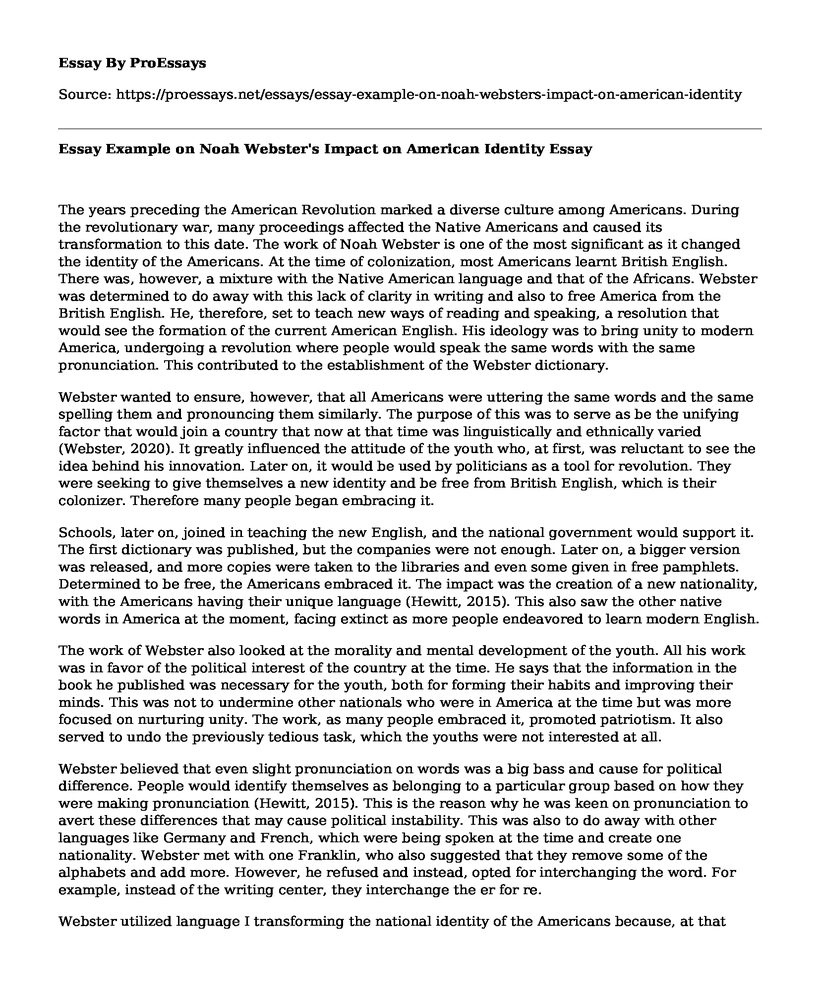The years preceding the American Revolution marked a diverse culture among Americans. During the revolutionary war, many proceedings affected the Native Americans and caused its transformation to this date. The work of Noah Webster is one of the most significant as it changed the identity of the Americans. At the time of colonization, most Americans learnt British English. There was, however, a mixture with the Native American language and that of the Africans. Webster was determined to do away with this lack of clarity in writing and also to free America from the British English. He, therefore, set to teach new ways of reading and speaking, a resolution that would see the formation of the current American English. His ideology was to bring unity to modern America, undergoing a revolution where people would speak the same words with the same pronunciation. This contributed to the establishment of the Webster dictionary.
Webster wanted to ensure, however, that all Americans were uttering the same words and the same spelling them and pronouncing them similarly. The purpose of this was to serve as be the unifying factor that would join a country that now at that time was linguistically and ethnically varied (Webster, 2020). It greatly influenced the attitude of the youth who, at first, was reluctant to see the idea behind his innovation. Later on, it would be used by politicians as a tool for revolution. They were seeking to give themselves a new identity and be free from British English, which is their colonizer. Therefore many people began embracing it.
Schools, later on, joined in teaching the new English, and the national government would support it. The first dictionary was published, but the companies were not enough. Later on, a bigger version was released, and more copies were taken to the libraries and even some given in free pamphlets. Determined to be free, the Americans embraced it. The impact was the creation of a new nationality, with the Americans having their unique language (Hewitt, 2015). This also saw the other native words in America at the moment, facing extinct as more people endeavored to learn modern English.
The work of Webster also looked at the morality and mental development of the youth. All his work was in favor of the political interest of the country at the time. He says that the information in the book he published was necessary for the youth, both for forming their habits and improving their minds. This was not to undermine other nationals who were in America at the time but was more focused on nurturing unity. The work, as many people embraced it, promoted patriotism. It also served to undo the previously tedious task, which the youths were not interested at all.
Webster believed that even slight pronunciation on words was a big bass and cause for political difference. People would identify themselves as belonging to a particular group based on how they were making pronunciation (Hewitt, 2015). This is the reason why he was keen on pronunciation to avert these differences that may cause political instability. This was also to do away with other languages like Germany and French, which were being spoken at the time and create one nationality. Webster met with one Franklin, who also suggested that they remove some of the alphabets and add more. However, he refused and instead, opted for interchanging the word. For example, instead of the writing center, they interchange the er for re.
Webster utilized language I transforming the national identity of the Americans because, at that period, knowledge was being developed through apprenticing and reading. This knowledge was made available to people through the publication of books. Thus, new identity revolutionists like Webster and Franklin Ben utilized books as a way of actualizing the transformation. The previous literary work was brought, and most youths would not read but instead learn through apprenticing. The change for language and pronunciation was part of Webster's plan of making it captivating and, therefore, making most of the youths reading the books. His dictionary and books on reading and pronunciation were also widely published and thus accomplished the changing of the American nationality to the current American English.
Conclusion
In conclusion, Webster, among other national identity revolutionists, is credited for American unity and nationality at the moment. The native languages which were being spoken vanished and thus promoting one citizenship where individuals speak the same vocabulary. This also served to reduce political interests and reduce the influence of political leaders. The power of other words like the It also reformed the education system as much more youth resorted to learning through reading and not apprenticing. The eagerness for freedom transformed faster, and the impact is seen even to date. Patriotism was also cultivated by this new system introduced by Webster and other language professors, therefore, changing the national identity of the Americans forever, marked even in this present period.
References
Hewitt, T. (2015). Understanding and shaping Curriculum: What we teach and why. EBook.
Webster, N. (2020). Lessons on Reading and Speaking, Calculated to Improve the Minds and Refine the Taste of the Youth.
Cite this page
Essay Example on Noah Webster's Impact on American Identity. (2023, Apr 18). Retrieved from https://proessays.net/essays/essay-example-on-noah-websters-impact-on-american-identity
If you are the original author of this essay and no longer wish to have it published on the ProEssays website, please click below to request its removal:
- Essay Sample on Mixed Economy
- Essay Sample on Diversity and Access in Healthcare
- Cherokees: A Southeastern Tribe Who Met White Invaders - Essay Sample
- Essay Sample on Jewish Museum, Camden: Preserving Jewish Heritage & East End History
- Alcohol Abuse Among Teens: Adverse Effects on Health & Future - Report Sample
- Essay Sample on Navigating Gay Rights: The Dilemmas & Challenges Facing the State
- Free Paper Sample on Aldrich Ames, a Central Intelligence Agency Spy







